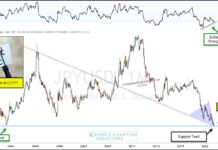The International Monetary Fund (IMF) can be considered the worlds’ central bank. As such, the IMF has its finger on the pulse of the global economy and current activity.
So when Christine Lagarde, the head of the IMF, begins to sound an alarm it behooves investors to take note. And her concerns mesh with the concerns I’ve raised about a cyclical downturn in the global economy over the past year.
Here’s an excerpt from a recent post in the Wall Street Journal about Lagarde and the challenges facing the global markets:
After more than a decade of stellar growth, emerging markets are falling headlong into new era of anemic output and market turmoil. Investors are pulling cash out in droves, fueled by an unexpectedly fast deceleration in China, the world’s second-largest economy. The IMF warns of a coming wave of corporate defaults after five years of gorging on central bank-fueled cheap credit. Emerging-market woes risk fomenting contagion in U.S. markets.
But there’s more. Here are a few more quotes from the article that I believe are worthy of attention:
“…Christine Lagarde faces some of the most volatile conditions in global markets since the financial crisis, a reflection of deep-seated worries about the world economy’s course.”
“To help the global economy avoid another downturn, Ms. Lagarde will… nudge finance leaders into what she says is an urgent policy upgrade. “Action is required now.”
“The fund, owned by its 188 member nations, will issue sharp warnings this week that the global economy faces a long period of anemic growth, or even stalling, if policy makers fail to act in concert to boost growth.”
“My biggest concern is if the combination of downside factors should happen all at the same time,” she said in a recent interview.”
And in the spirit of covering recent events, here are a few more nuggets of news and insights:
Here’s what WSJ’s Ian Talley @IanTalley tweeted out about global growth:
IMF sees 50% chance of global growth below 3% next year, a level below which is “equivalent to a global recession.” pic.twitter.com/LC9N2El1yd
— Ian Talley (@IanTalley) October 6, 2015
Here’s a headline from the Guardian: IMF warns of stagnation threat to G7 economies. And here’s an excerpt from that story:
In its half-yearly update on the health of the world economy, the Washington-based fund predicted expansion of 3.1% in 2015, 0.2 points lower than it was expecting three months ago and the weakest performance since the trough of the downturn in 2009.
So What does all this mean? Is a cyclical downturn in the economy occurring?
I believe it is further anecdotal evidence that we are in the early stages of a cyclical downturn. In other words, despite the best efforts of government to eradicate the economic cycle, it is still alive and well.
Their efforts have caused the current expansion to last much longer than it normally would, but the risk is that we could see another decline on par with the crashes in 2000 and 2008 if the environment (and policies) don’t quickly improve.
That’s why I (generally) don’t have much exposure to stocks in this environment. The volatility of owning stocks is much higher than normal and that risk continues. I evaluate the data on a daily basis and will change my mind as the data does, but the trends that are currently moving our markets tend to evolve over months and quarters, not days or weeks. And this favors Treasury Bonds near-term in my opinion.
I have recently added exposure to the shorter end of the US Treasury yield curve in treasury bond ETFs – the 3-7 Year Treasury Bond ETF (IEI) and and the 7-10 Year Treasury Bond ETF (IEF) – with the idea of maintaining value in the midst of higher than normal stock market volatility. Thanks for reading.
Thanks for reading.
Twitter: @JeffVoudrie
Author has positions in mentioned securities. Any opinions expressed herein are solely those of the author, and do not in any way represent the views or opinions of any other person or entity.








